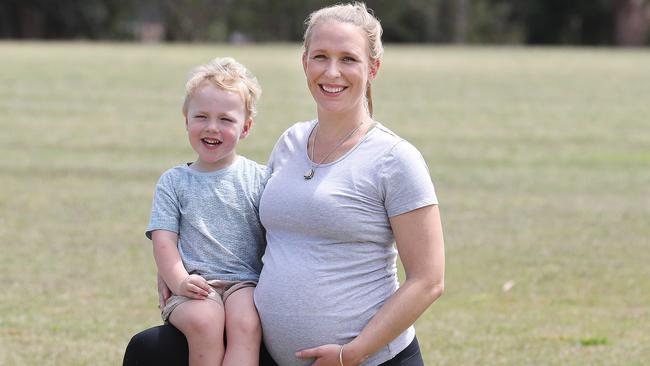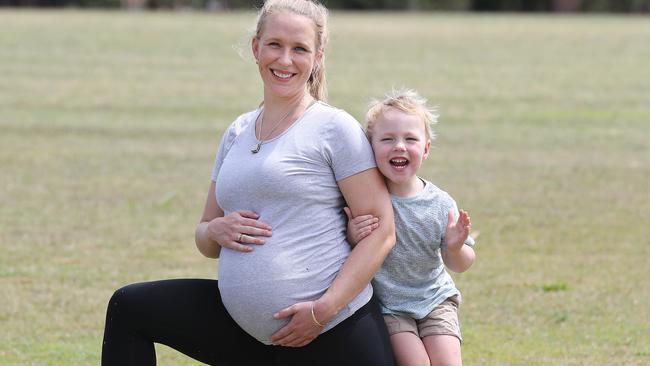Vigorous exercise ‘safe’ for most women in the final months of pregnancy
Pregnant women are often told what they can’t do, but now a pregnant Queensland physiologist has settled the science on a healthy activity.

QLD News
Don't miss out on the headlines from QLD News. Followed categories will be added to My News.
VIGOROUS physical activity is safe for most women during the final stages of pregnancy, Queensland research has found.
Exercise physiologist Kassia Beetham analysed 15 international studies, involving more than 32,000 mums-to-be, finding the risk of a premature birth was slightly less in pregnant women who exercised strenuously in their third trimester.
Almost half of pregnant women have their labour induced
Dr Beetham, of the Australian Catholic University in Brisbane, decided to study the impact of vigorous-intensity exercise during the final three months of pregnancy while expecting her son Rex, now 3.
“I did swimming right up until a couple of days before I gave birth,” she said.
“It was mostly moderate exercise but I did do some faster, higher intensity laps of the pool.
“I thought: ‘I’m pretty sure this is safe.’
“But the research has reassured me personally enough to say, ‘OK, I was doing the right thing.’
“It was safe.”
Dr Beetham, who is 36 weeks pregnant with her second child, described vigorous exercise as getting puffed to the point where “you struggle to maintain a conversation but can still manage a sentence”.

She said she had not been as cautious about vigorous exercise during her second pregnancy after studying the available research.
“I’m still going to the gym, I’m doing weightlifting with light weights,” she said.
Her study, published in BMC Pregnancy and Childbirth, found some women who exercised vigorously during their final trimester gave birth to babies of slightly lower birthweight, although the difference was not considered significant.
“It would seem pertinent to suggest that women who are carrying foetuses on the lower end of the weight chart in the later stages of pregnancy should be cautious about undertaking vigorous exercise,” Dr Beetham wrote in the paper.
In an interview she added: “There are some conditions in pregnancy where you shouldn’t be exercising.

“It’s always worth checking with your obstetrician what you’re able to do, whether you can exercise at all or if you can only exercise at light to moderate intensity.
“What we need is an exercise physiologist in every obstetrics department to be able to give that advice.”
Obstetrician Gino Pecoraro said that due to hormonal changes, mums-to-be were more likely to get sprains with minimal force compared to women who were not pregnant.
“Very few women would be undergoing vigorous exercise in pregnancy — the far greater problem is getting women to exercise at all,” he said.
“Generally speaking, we recommend low-impact activities, such as walking or swimming.”
Associate Professor Pecoraro said he did not recommend extreme exercise because of concerns a pregnant woman’s altered centre of gravity with her enlarging abdomen could affect balance and make falls more likely.


